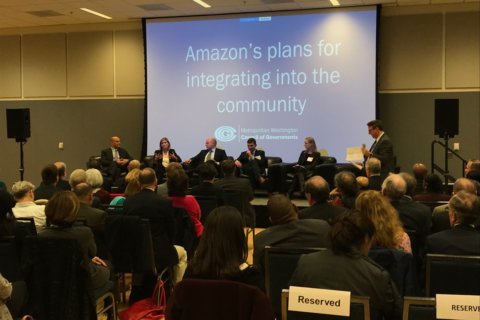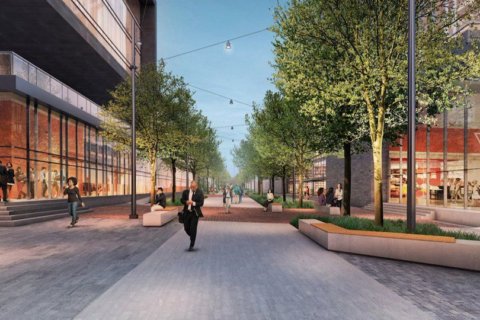ARLINGTON, Va. — Details of Amazon’s planned Crystal City headquarters are trickling in and what the company’s presence is expected to do for the region’s economy.
The company pledged to hire 25,000 people from around our area to work in Arlington, but an expert said the quality of the jobs is more important than the quantity.
“The reason Amazon is important for the Washington region is the types of jobs, not necessarily the magnitude of the jobs that it’s going to bring,” said Jeanette Chapman, deputy director at George Mason University’s Stephen S. Fuller Institute, which studied the potential impact of Amazon’s arrival. “They are private sector, they aren’t dependent on the federal government, and they’re high value-add.”
Amazon said it plans to hire highly skilled workers for an average salary of about $150,000 per year, and that average will go up as years go by.
Chapman said our region is overly dependent on jobs associated with the federal government, and that’s hurt us.
“The overall result over the past 10 years has been the federal government has held down our growth relative to the national economy,” she said. “This pattern shows up in average wages, as well. Average wages peaked in our region in 2010 before declining through 2013, and they didn’t return back to their 2010 peak until 2017.”
But Chapman said prices have not done the same.
“Price levels have been consistently 19 to 20 percent higher than the national average in our region. That means that when we have dips, it gets compounded by our prices in a way that other areas don’t have.”
“Amazon will build on our advanced industrial cluster base,” said Chapman. “These are not federally dependent (jobs). We already have a competitive advantage in these jobs, and they’re high value-add and high wages; however, they have been underperforming their potential for the past three years.”
She said in 2017, the region got a one-time boost from the late 2016 opening of MGM National Harbor. But Amazon’s HQ2 will produce much different results.
“Amazon will have sustained growth for the next decade that will have a cascade effect, not only within the advanced industrial cluster ecosystem, but into the broader economy. They have larger secondary and tertiary needs that then roll in and help bolster the economy overall.”
Stephen Moret, CEO of the Virginia Economic Development Partnership, led the effort to lure Amazon to Virginia.
“When you look at the project, it was right in the bull’s-eye of where we’re trying to go with the Virginia economy. Our single biggest growth opportunity in the commonwealth for the foreseeable future is in tech: cybersecurity, software development, data centers, unmanned systems, a whole range of different spaces,” he said.
“This project, when you consider both the 25,000 direct jobs as well as at least 22,000 indirect jobs … folks that would be in the Commonwealth of Virginia, (that) will be enough to close roughly 25-50 percent of our 10-year job growth gap to get back into the top 10 states (for job growth).”
For the $550 million in state incentives being offered as part of the deal, Virginia expects to get back at least $3.8 billion in new state general fund revenue. That’s more than six dollars back on every dollar spent.
“(We’ll have) a tremendous amount of new revenue available to fund health care, public education and other things across the commonwealth,” Moret said.
“Perhaps the thing that we’re most excited about is, this project has been a catalyst for a historic investment in Virginia’s tech talent pipeline. The state is committing up to about $1.1 billion to more than double the annual production of graduates in bachelor’s and master’s degrees in computer science, computer engineering, software engineering and so forth. That is going to be meaningful, not just for Amazon’s needs, but for all of the tech sector in Northern Virginia and beyond.”
Chapman and Moret spoke at panel discussion held Thursday in Arlington, organized by the Metropolitan Washington Council of Governments.







